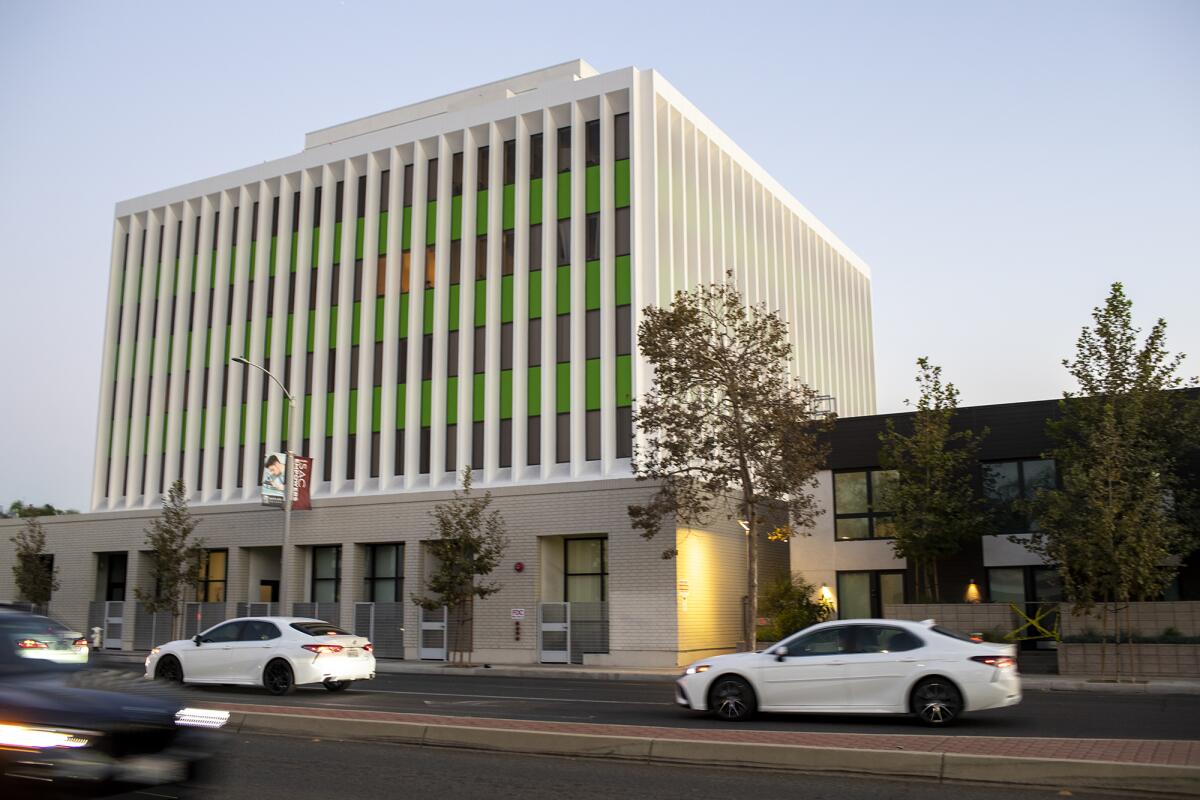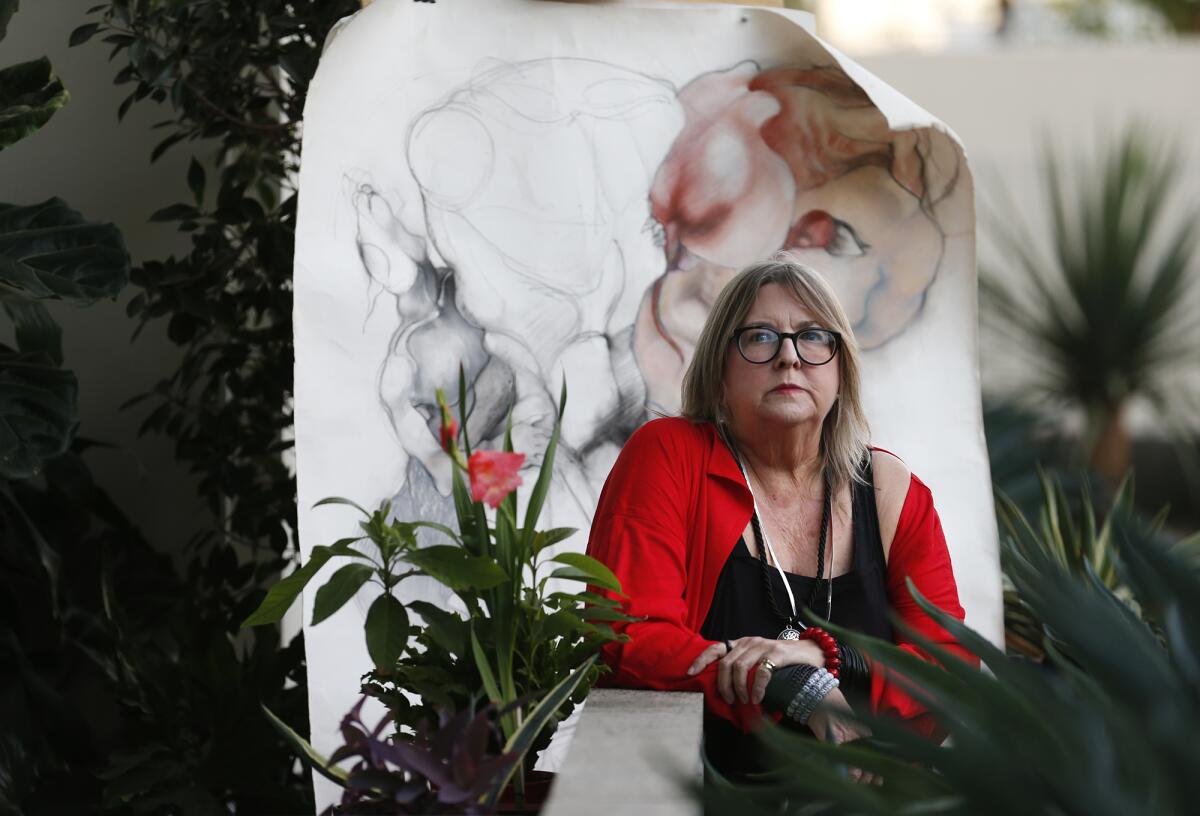Complaint says Santa Ana Arts Collective’s affordable housing comes with price of living in fear

- Share via
Lisa Warmuth thought she had found an ideal community of like-minded creatives when moving into the Santa Ana Arts Collective apartments a year ago. The silverpoint artist sold her lakefront home in northern Minnesota and looked forward to a new lease on life.
The five-story bank building along 17th and Main streets had been transformed into a highly touted 58-unit affordable housing complex intended as a live-work haven for low-income artists. Meta Housing, the Los Angeles-based developer behind SAAC, received Innovative Development honors at the Affordable Housing Awards in September.
But instead of inspiration or innovation, Warmuth found dread at her doorstep after regular run-ins with several nonresident drug users who seemingly had easy access to the premises.
“Never have I felt this afraid,” Warmuth said. “There’s many children here who’ve been exposed to multiple instances of drug use, drugs, needles, defecation, masturbation and public nudity.”
She’s not alone.
A lengthy complaint sent to the city’s Housing Authority on Sept. 8 on behalf of nearly 20 tenants and 25 children who call SAAC home outlined several allegations. It stated that drug deals on the property are commonplace as are drug parties that attract nonresidents, who say they’re invited guests.
Townhouse tenants on the ground floor have documented incidents of homeless people using drugs, masturbating and defecating on their patios.
Efforts by management to secure the property have fallen short, the complaint argues. Security guards have been hired and fired while the city ordered a temporary, unpermitted fence to be taken down. Women tenants report being too afraid to use the laundry area or even be in the parking garage without fear of harassment.
“Our clients take all resident concerns very seriously and have spent a considerable amount of time investigating the issues and allegations mentioned in the letter, some of the matters our clients have already been addressing prior to receiving a copy of the letter,” attorney Susan Lein wrote on behalf of Santa Ana Arts Collective LP in an Oct. 12 response to the city.
Property owners claimed to have received no complaints from any tenants about drug sales or parties prior to September. They further deny that any Fair Housing Act violations have occurred as alleged and, instead, say they have operated in accordance with the law as well as Low-Income Housing Tax Credit program requirements.
The situation at SAAC attracted the attention of Andrea Lee Harris, an arts administrator and educator at Santiago Canyon College who recently visited the premises unannounced. What she found, from an unpermitted gate to a locked and darkened makerspace, seemed off.
“I’ve been involved in the arts in Santa Ana for the past 25 years and know we all long for projects that will enhance the city and lives of tenants and community,” said Harris, who was the founding director of the Cal State Fullerton Grand Central Art Center in downtown Santa Ana. “This project was meant to serve artists, and it’s not a safe, well-managed space. No one can live and work in a hostile space and be creative or productive.”
According to the complaint, tenants “have witnessed fights, assaults and people with guns and knives routinely frequenting the sidewalks behind their units, as well as prostitutes servicing their customers by the side of the building. One female tenant reports that a man attempted to grab her as she was walking outside the property. She later found that same man in the building’s elevator.”
The most serious allegations detail an attempted child abduction as well as questions surrounding two dead bodies on-site.
Addressed to Santa Ana’s Housing Authority, the 16-page complaint also detailed where artist tenants — the painters, musicians, ceramicists, digital artists and jewelry makers who give the complex its identity — didn’t feel adequately supported.
Among the chief criticisms are the lack of programs for artist tenants and the limited availability of makerspaces, despite the hiring of a full-time program director more than a year ago.

“I was thrilled to death to move here,” said Warmuth, who signed the housing complaint. “Here, I’d be in an artist community with artists, but it’s not an artist community.”
When soliciting artist tenants back in 2019, Meta Housing faced criticism from local Santa Ana artists for hosting an outreach workshop in Highland Park, a community in Los Angeles. Amid gentrification fears, questions also were raised about whether local artists would be prioritized for exhibitions at the planned ground-floor gallery on the property.
Santa Ana invested $7.9 million into the affordable housing project, which boasts being the first under a new adaptive reuse law passed in 2014. After several delays, SAAC finally opened last year.
In time, artist tenants who did get approved realized that not all of their neighbors were low-income creatives, whether local to O.C. or not. The complex is also home to several supportive housing tenants. The complaint speculates that an agreement was made with the city to include such residents as not enough artists could be found or that it was done to acquire additional funding.
A Santa Ana Housing Authority official dismissed the former notion as untrue while affirming the latter.
“On Sept. 24, 2018, the city received a written request from Meta Housing as the developer for the Santa Ana Arts Collective to apply for Mental Health Services Act funds available through the County of Orange to close a remaining financial gap,” said Judson Brown, housing division manager. “The city supported their application for the funding and the project serving this target population.”
The initial lease approved 23 artist, 20 low-income and 15 supportive housing tenants for residency. But according to the complaint, some supportive housing tenants aren’t getting the help they need, including consistent access to case managers.
That claim, along with all the others, prompted the city to review the complaint while Housing Authority officials conducted an inspection of SAAC’s common areas on Sept. 30.
“The city and Housing Authority do not own or manage the Santa Ana Arts Collective,” said Paul Eakins, city spokesman. “However, the city is deeply concerned about the allegations and is actively working with the owner to ensure that corrective actions are taken and that a written response is provided to the tenants to address all of their concerns.”
On Oct. 12, a detailed reply by their attorney was delivered to Brown first.
“The letter submitted by a few of the residents was full of misrepresentations, false claims and inaccuracies,” it read. “Many of the maintenance issues are already being addressed and were in process before our clients received their letter. Any challenges that remain with the services, [permanent supportive housing] residents, or the surrounding transient population will be continued to be worked on in a collaborative manner with the residents, our service providers, financing partners, the city of Santa Ana and local law enforcement.”
Property owners claim to have already spent $400,000 on improvements.
Not all residents have painted a dire portrait of life at SAAC. Lorna Manapat moved into her apartment last summer as a painter and a single mother.
“Thank God, I have a place,” she said. “My only complaint is not having any open windows, but it’s something they’re looking to fix.” Manapat points to the free on-site Telecare clinic as a benefit that shows the developer cares about the well-being of residents.
She doesn’t shy away from the challenges the community has faced, but after a management survey last month, things appear to be changing. “When it comes to security and drugs, finally management is doing something about it,” Manapat said. “I see differences now. Some neighbors were evicted.”
Security gates properly lock while keys are needed to access the staircase and laundry area.
Will the spate of recent changes be enough to allay the concerns of other tenants?
The complaint is requesting a slew of documents from Meta Housing while calling for the establishment of a Tenant Council with oversight by the Corp. for Supportive Housing. Property owners invite tenants to form such a body without interference.
For Warmuth, seeing a sweeping response at SAAC would rekindle the hope that attracted her to the complex in the first place. She was 5 years old when admitted to the Cranbrook Academy of Art and later earned a college scholarship to attend the Detroit Institute of Art. But her artist life atrophied afterward on account of competing responsibilities.
Until now, her studio space at SAAC hasn’t lived up to its promise.
“Where I am now was supposed to be my dream,” Warmuth said, “and my dream has literally turned into a nightmare.”
More to Read
Sign up for Essential California
The most important California stories and recommendations in your inbox every morning.
You may occasionally receive promotional content from the Los Angeles Times.











